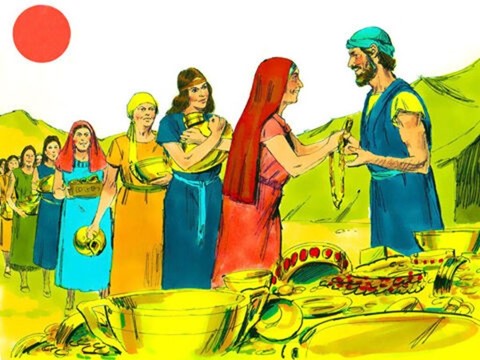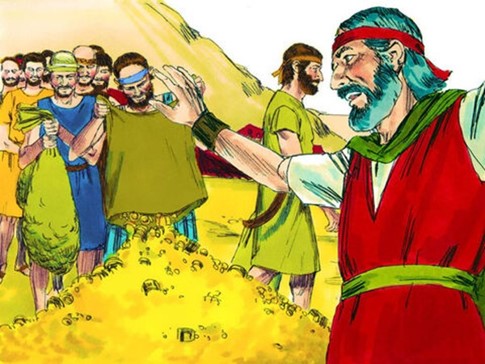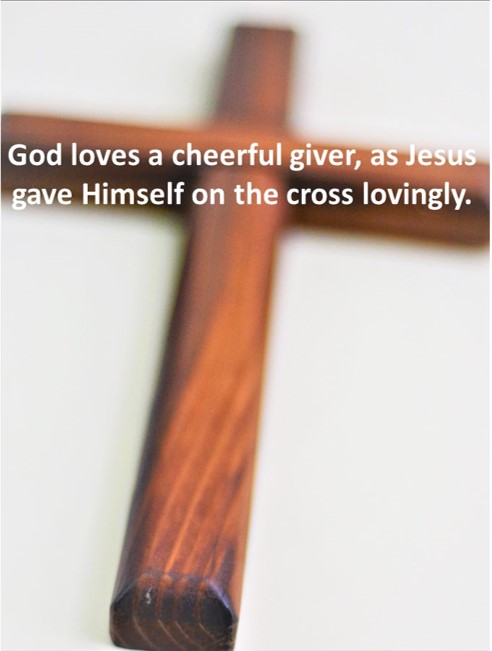Good morning!
Greetings in the name of the Father, the Son, and the Holy Spirit.
For it is God who works in you to will and to act in order to fulfill his good purpose. (Philippians 2:13)

In the heart of the Sinai desert, with the echoes of newfound freedom ringing in their ears, the Israelites faced a divine commission: to build a sanctuary, a sacred space for the presence of God. The story in Exodus 36:3-7 is not just a recount of this ambitious project, but it’s a testament to the extraordinary generosity that fueled it.
Today, as we gather to ponder this ancient narrative, we are invited to witness the remarkable spirit of a people who gave freely and wholeheartedly to God’s work. Their contributions went beyond the call of duty, emerging from a deep sense of gratitude and commitment.
As we consider their actions, let’s also reflect on our own approach to generosity. The Israelites remind us that giving should come from the heart, not from what we have left over, but from what we cherish. In studying their example, may we too be moved to give in ways that truly reflect our devotion and our understanding of what it means to be a part of a God’s family, one that builds together for a common, sacred purpose.
Let us step into this story, allowing it to shape our own, as we learn what it means to give not just adequately, but abundantly, with a spirit that matches the vastness of the desert and the boundlessness of God’s love.

Point One: A Heart that Gives Willingly (Exodus 36:3-5)
When the dawn whispered over the peaks of Sinai, it witnessed a stirring sight—men and women, once shackled by the chains of Egypt, now flocking freely to offer their treasures for a purpose that transcended their own survival. The offerings for the sanctuary were not extracted by the heavy hand of obligation but were the outpourings of liberated spirits, a mosaic of gratitude painted with the resources they had.
This phenomenon of willing hearts was no accident or casual occurrence; it was a testament to a transformative encounter with God. The divine deliverance they had experienced was not just an external shift from bondage to freedom; it was an internal journey from selfishness to generosity. “Take from among you a contribution to the Lord. Whoever is of a willing heart, let him bring it as the Lord’s contribution” (Exodus 35:5), Moses had proclaimed, and their response was more than obedience—it was a crescendo of willing spirits.
The offerings were as diverse as the givers—gold, silver, bronze, fine linen, goats’ hair, and much more, each item representing a personal act of worship, a tangible echo of a heart’s devotion. It paints a vivid picture that challenges us in our current era of wealth and abundance. Do we give out of surplus and convenience, or do we give from a place of intentional sacrifice and joy?
The narrative unfolding in Exodus 36 is not solely about material donation; it is a narrative of inner transformation. The people of Israel were becoming a community defined by generosity, a reflection of the Divine nature itself. “God loves a cheerful giver” is not just a principle; it is a path to emulate the heart of God. Paul’s words in 2 Corinthians 9:7 encapsulate the spirit of the Israelites’ offerings, which were not given reluctantly or under compulsion, for their giving reflected the very character of God—a cheerful, willing, abundant overflow of provision.
Their story becomes a mirror for our souls, an invitation to evaluate the posture with which we approach giving in all its forms. Are we moved by the Spirit, offering our resources with a joy that rivals the morning sun’s first golden rays? Or do we give sparingly, reluctantly, holding back as if our resources were our own creation and not a gift from the Creator Himself?
In a culture that often equates giving with loss, the Israelites’ example stands in stark contrast, suggesting that true giving is not a subtraction but an expansion—a multiplication of the blessings we have received. It beckons us to believe, as written in Luke 6:38, “Give, and it will be given to you. A good measure, pressed down, shaken together and running over, will be poured into your lap. For with the measure you use, it will be measured to you.”
Let us, therefore, approach giving not as an interruption to our well-laid plans but as an integral expression of our faith. May our offerings—whether of time, talents, or treasure—spring from a well of gratitude that never runs dry, pouring out in willing generosity that delights in the act of sharing the blessings that first flowed from the heart of our generous God.

Point Two: Generosity that Overflows (Exodus 36:5-7)
The narrative of Exodus 36:5-7 paints a vivid image of abundance that challenges our often scarcity-minded hearts. “The people bring much more than enough for doing the work that the Lord has commanded us to do” (Exodus 36:5b), and this ‘much more’ speaks volumes. The Israelites’ giving surpassed necessity and overflowed into abundance, signaling a generosity that was not just adequate but extravagant.
This overflow did not deplete their resources; it magnified them, revealing a principle that when we pour out generously in God’s service, He multiplies our offering in His divine economy. The scene at Sinai is reminiscent of the words of Jesus in Luke 6:38, where the measure of our giving is promised to be pressed down, shaken together, running over, and returned to us. It reflects the kingdom principle that in giving, we receive—not as a transactional occurrence, but as a transformational reality.
The excess was so remarkable that it led to an unprecedented command from Moses—a directive to stop giving because they had more than what was needed. It is almost unimaginable in modern days, yet this was the case for the Israelites. Theirs was a community so moved by God’s generosity that they could not help but respond in kind.
In 2 Corinthians 8:2, the Apostle Paul speaks of the Macedonian churches whose “extreme poverty welled up in rich generosity.” They gave “as much as they were able, and even beyond their ability.” Here again, we see the principle that our capacity to give is not limited by our current resources but is expanded by our faith and willingness to trust God’s provision.
Moreover, this overflowing generosity was not a means to garner favor or prestige but a pure act of worship. The people gave as they were moved by their hearts and stirred by the Spirit, reflecting the sentiment expressed in 1 Chronicles 29:14, where King David acknowledges that all things come from God, and it is from His hand that we have given.
Their example calls us to move beyond a mindset of mere compliance to one of abundant, cheerful generosity. It challenges us to give in a manner that does not calculate the minimum required but joyfully seeks how much is possible. It beckons us to trust that our God, who “is able to bless you abundantly, so that in all things at all times, having all that you need, you will abound in every good work” (2 Corinthians 9:8), is the architect of abundance.
In this light, our generosity becomes an instrument of God’s providence, a testament to our faith in His ability to provide and a declaration that our security lies not in our possessions but in His promises. We are called to a life where our giving is not a mere trickle, hesitant and measured, but a cascade, joyous and unbounded, as we entrust our all to the One who gave His all.
In embracing this spirit of overflow, our congregations can become beacons of God’s love and provision, places where the needs of the ministry and community are not just met but exceeded. This approach to giving changes the landscape of our personal lives and the collective life of the church. It encourages us to set aside our calculations and limitations and enter into the fullness of God’s boundless generosity. Let us therefore give, not from our leftovers, but from our first fruits, not reluctantly, but with a profound sense of privilege, knowing that in the kingdom of God, the economy of overflow is the norm, and in our giving, we are truly blessed.
Point Three: Multiplication of Our Gifts (Exodus 36:7)
The third and perhaps most miraculous aspect of the Israelites’ generosity is seen in the multiplication of their gifts. They brought more than was needed for the work of the sanctuary, so much that their contributions needed to be halted. This phenomenon was not a mere excess; it was a divine multiplication, a testament to the principle that God expands what is given in His service.
This multiplication of offerings echoes throughout Scripture and into our present reality. It is reminiscent of the five loaves and two fishes in the Gospel of Matthew (14:17-21), where Jesus feeds the five thousand. The disciples’ meager offering, in the hands of Christ, became more than sufficient; it was abundant. In this, we see a profound truth about the nature of giving in God’s economy: what is offered to God in faith and obedience is transformed and multiplied for His purposes.
In our lives today, the multiplication of our gifts often manifests in ways we might not anticipate. It may not always be material; sometimes, it’s the spiritual and relational blessings that proliferate. As we give of our time, talents, and treasure to God’s work, we often find that our own lives are enriched, our relationships deepened, and our spiritual journey intensified. Paul understood this when he wrote to the Philippians (4:17), not seeking the gift itself but the “fruit that increases to your credit.”
The key to this multiplication is found in our willingness to give first. Proverbs 11:24-25 states, “One person gives freely, yet gains even more; another withholds unduly, but comes to poverty. A generous person will prosper; whoever refreshes others will be refreshed.” It is a promise that as we pour out in service to God, He replenishes and expands our capacity to serve and give even more.
It is important to note that this multiplication is not merely for our individual gain but for the advancement of God’s kingdom. As we give, and as our gifts are multiplied, the reach of God’s love and the impact of His church are extended. Our generosity becomes a catalyst for growth, not just within the walls of our own church, but in the broader community and beyond.
Moreover, the multiplication of our gifts reflects the very nature of God—His generosity is limitless, and His desire is to bless us abundantly. Ephesians 3:20 reminds us that He is “able to do immeasurably more than all we ask or imagine, according to his power that is at work within us.” Our gifts, given in faith, tap into this divine power, allowing God to work through us in ways that far exceed our human calculations.
In practice, this means approaching our giving with an expectancy that God will use our offerings far beyond the scope of our understanding. It means trusting that our acts of generosity will not diminish us but will align us with God’s grand design of abundance and provision. It means understanding that our giving is an investment into the eternal, yielding returns that reach into the far corners of heaven’s interests.
Thus, as we give—whether it be of our finances, our time, or our talents—we do so with the knowledge that we are participating in God’s divine multiplication. We are part of a heavenly equation where the sum is always greater than its parts. Let us, therefore, give generously, give faithfully, and give expectantly, knowing that in God’s hands, our gifts are seeds sown into the fertile soil of His kingdom, destined to produce a harvest beyond our wildest dreams.
Summary and Life Application:
In summarizing our journey through Exodus 36:3-7, we’ve witnessed a tapestry of giving woven with threads of willingness, abundance, and divine multiplication. The sanctuary they built was a testament to what can be accomplished when God’s people come together, united in a spirit of generous giving.
Now, we turn to the application of this ancient story to our contemporary lives. The same God who moved upon the hearts of the Israelites is moving among us today. Are we attentive to His prompting to give? Are we giving in a way that not only meets needs but also spills over to bless others abundantly? And do we trust in God’s ability to multiply our offerings?
As we step forward into this week, let’s do so with a renewed commitment to generosity. Let’s give of our time, talents, and treasures not as a duty but as a heartfelt response to God’s incredible generosity toward us. Jesus Christ, our savior, is the example and proof, who paid all our transgressions and sins on the cross. Let’s look for opportunities to contribute to God’s work in such a way that it may be said of us, as it was of the Israelites, “Their contributions were more than enough.”
In the quiet moments of prayer that follow, may we each ask God to cultivate in us a spirit of generosity that reflects His heart. May we be a people whose giving knows no bounds, whose resources are used for the building up of the kingdom, and whose lives bear witness to the multiplying power of our generous God.
And let us never forget, in the simple yet profound act of giving, we encounter the very heart of the Gospel— For God so loved the world that he gave his one and only Son, that whoever believes in him shall not perish but have eternal life. (John 3:16), and in giving, we find ourselves ever more like Him.
In closing, we offer this benediction: May the Lord make your love increase and overflow for each other and for everyone else (1 Thessalonians 3:12a). Go forth in the spirit of generosity that you have received, and let it shine through every aspect of your lives.
Amen.

Remember the words of the Lord Jesus, how he himself said, ‘It is more blessed to give than to receive.’ (Acts 20:35b)
